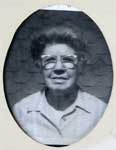
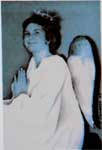
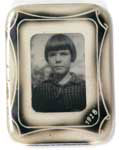
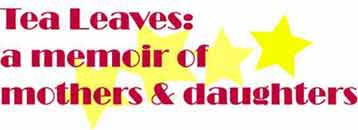
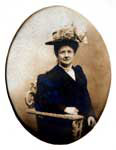
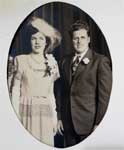
  |
 |
 |
 |
 |
|
|
To read other sections click here. Excerpts from the first chapter of Tea Leaves: a memoir of mothers and daughters: Your
grandmother read tea leaves." My mother's matter
of fact tone does nothing to alleviate the direness of my visit. I came over to visit immediately after I found out she had woken up a few days ago with a crushing pain on her sternum. She felt like she was having a massive coronary. My mother--who also does not believe in doctors-- went to one immediately. He ordered some X-rays, told her it was arthritis, and sent her home with some extra strength Tylenol. When she told me this, my mind reeled. How could my mother who walks four miles a day wake up feeling like she was having a coronary? "Why didn't you call?" I asked her on the phone. "I just did," she said. I didn't argue, but
the fact was that I had called her. There was something in her voice I
had never heard before. Fatalism. A giving-up. This dead-end tone of voice
coming from my mother pushed me to panic. Illness or not, I couldn't conceive
of her coming to a standstill. I drummed my fingers. My mind raced. There
must be something that I could do. "There's special diets for arthritis,"
I said. "Let me stop at the health food store and I'll be right over." At the same time that I leapt to action, the center of me came to a quiet immovable standstill. A booming silence told me that something dreadful was wrong. The bottom of my world began to drop away. ..... My grandmother, Ethel, a devout Episcopalian, life-long Republican, and wearer of white gloves, gave birth to my mother, Jane (Plain Jane, her childhood nickname) who became an equally devout Atheist (burning her bibles in the backyard) and a Democrat. My mother identified with the "silent majority," but was a feminist ahead of her time, and when the women's liberation movement caught up with her, she joined it. When I was old enough, she sometimes took me with her, the two of us marching and attending rallies, waving our matching mother daughter coat hangers at pro-choice events. As a child and even a teenager, I was the less adventurous one--hanging back and watching with something bordering on amazement as my mother heckled the hecklers and squeezed the balloon testicles of a Ronald Reagan cardboard cutout. ..... I laugh as I go into the kitchen to fix myself a cup of chamomile tea. As I pour the water into the cup, I notice there's a tear in the corner of the bag. A few tea leaves, crushed yellow flowers, seep out into the water and swirl around. I stare into the white porcelain tea cup, wondering. What kind of life I would have if knowledge and wisdom were passed uninterrupted and uncensored, from my great grandmothers down to my grandmother, mother and then to me? This world shimmers up at me for a fleeting moment. Then I see the reflection of my mother's face in mine. The lines of resignation, her disappointments, her fears stare up at me. I shudder, then skim
the floating leaves away with a spoon and go back into the living room.
Like my mother, I am a hopeless realist. I don't want to get the stray
tea leaves on my tongue. The fact is that if I could read the signs and
see the dark clouds and crosses on the horizon I would not want to. I
have always been wary of astrologists and fortunetellers. It's more than
a healthy dose of skepticism. It's superstition. I am afraid that if someone
tells me my future, I will have no choice other than to create that destiny
for myself. The only omens I
can read are my memories of my past. When I was a child I brought home
report cards saying I was an underachiever. In elementary school I came
home with bit parts in plays in which my mother thought I should star.
In junior high my grades didn't measure up to study the foreign languages
in which she expected fluency. She accuses me of wanting her to be more than she is. I, in turn, deny that I want my mother to be anyone except who she is. Neither of us is as sure in our denials as we'd like to be. Only one thing is certain: whichever way we turn the mirror, the reflection comes up wanting. My mother is more stubborn than me. Her mind is made up. Their lives, her mother's and her own, were wasted, good for nothing but survival. No amount of arguing or cajoling can change that. But she nods her head to appease me, and by so doing acknowledges that her life is linked with mine.
|